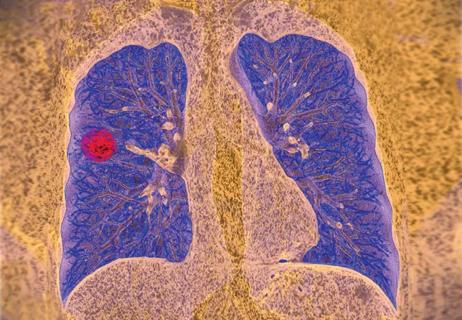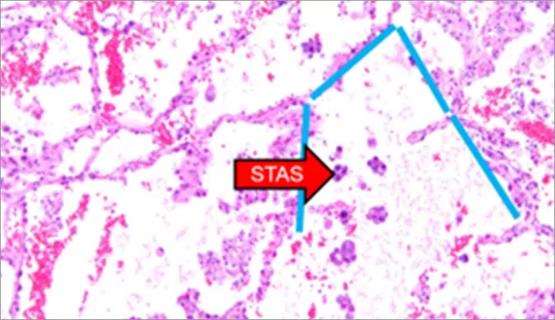Quantum computing being studied as a means to help improve predictive performance, accuracy

Written by Peter Mazzone, MD, MPH
Advertisement
Cleveland Clinic is a non-profit academic medical center. Advertising on our site helps support our mission. We do not endorse non-Cleveland Clinic products or services. Policy
Early cancer detection through cancer screening can save people’s lives. Cancer screening is the standard of care for four cancers, including lung cancer, where screening using low-radiation dose chest CT scans has been United States Preventive Services Taskforce (USPSTF)-approved for the last eight years. Despite this, only a quarter of all lung cancers are diagnosed at an early stage.
There are several reasons for the disconnect. The USPSTF implemented strict eligibility criteria based on age and smoking history which do not include all at-risk patients. Slow uptake of lung cancer screening with only approximately 10% of all screen-eligible individuals are enrolled in lung cancer screening programs. Poor adherence to annual screening is another contributor to delayed diagnosis – approximately just 25% of those who are screened return for their annual screening scan.
There is also concern about harm from the evaluation of false positives — the scans find a lot of benign lung nodules. For example, over 80% of those screened have at least one lung nodule. Twenty percent of those patients will require further evaluation, but only 1% of those cases will end up being a cancer.
An easy-to-use, accurate and inexpensive molecular biomarker (e.g., blood test) could help to overcome these barriers. Several high-quality, large-scale molecular biomarker discovery and validation studies are ongoing, and we are fortunate to be the clinical research lead for two lung cancer screening biomarker studies.
Advertisement
The first, in collaboration with DELFI Diagnostics, assesses the accuracy of a fragmentomics-based assay. The principle is that dying cells release DNA into the blood (cfDNA) where it is then digested. The fragments that result can vary in their length based on the nature of the cells that the DNA came from. In the latest study, the fragmentomics classifier was validated to detect 8 out of 10 lung cancers while decreasing the number of people who would need a scan by more than 50%.
The second, in collaboration with Nucleix, assesses the accuracy of a methylomics-based assay. The principle here is that methylation of DNA impacts gene signaling, and certain methylation changes are known to be associated with cancer. In the latest study, the classifier under development was able to detect nine out of 10 lung cancers while also decreasing the number of scans required by more than 50%.
Both of these classifiers accept tradeoffs in accuracy based on their intended use — to increase uptake and adherence in those who are currently screen-eligible. Essentially, these classifiers target high sensitivity at the expense of specificity. The large number of molecular variables that are measured, as well as the heterogeneity of lung cancer biology and the individuals who develop lung cancer, make it difficult to develop biomarker panels capable of being both highly sensitive and specific.
The fragmentomics classifier started with over 40 million DNA fragments measured across the genome, and the methylation classifier started with methylation levels of around 6 million genomic loci. Classical computers, and classical computing machine learning algorithms, struggle to find patterns with this number of variables or to identify interactions between chosen variables. To overcome this limitation, feature reduction is performed to allow classic computing machine learning algorithms to be developed, with the potential loss of valuable discrimination ability.
Advertisement
Quantum computing and quantum algorithms have the potential to identify patterns from large data sets more accurately than classical computing. Our partnership with IBM and the support provided by the Mandel foundation has given us an opportunity to explore the potential of quantum computing and quantum algorithms to improve the accuracy of these screening biomarkers with the IBM Quantum System One deployed at Cleveland Clinic. The onsite private sector IBM-managed quantum computer is the first quantum computer in the world to be uniquely dedicated to healthcare research.
We and our research partners (DELFI, Nucleix) will be evaluating the datasets developed as part of the ongoing biomarker development and validation studies. We hope to determine if applying quantum machine learning algorithms to the training of molecular biomarker classifiers improves the predictive performance of the biomarkers for early lung cancer detection compared to traditional machine learning approaches.
The implications of the research are substantial – at minimum, we will have the best-trained quantum team to answer similar questions over time, as quantum computing matures; and ideally, we will be able to improve the performance of these two classifiers, leading to acceleration of their implementation and a frameshift in how we screen for lung cancer.
Advertisement
Advertisement

Treatment assigned FDA review date in June 2025

Cleveland Clinic, the University of Minnesota and University of Cambridge receive $1M grant to develop point-of-care biosensor for early detection and treatment personalization

Hybrid treatment model helps improve cancer care access

Resection, radiotherapy or ablation?

Extent of baseline burden impacts progression-free and overall survival

Young age, solid tumor, high uptake on PET and KRAS mutation signal risk, suggest need for lobectomy

Targeting DNMT1 shows promise in chemotherapy- and immunotherapy-resistant SCLC

New review published in Cancers suggests a synergistic benefit